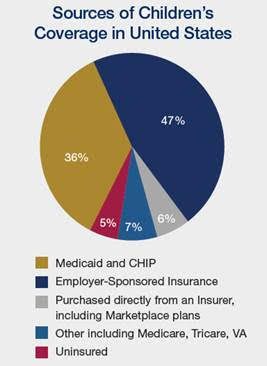Over the past year politics has taken over our lives. Our news, social media, conversations and, for some, our anxieties. As a pediatrician, my concerns with regards to lawmaking lie with how children and families will be affected by any given policy. I am an advocate; someone who publicly supports or recommends a cause or policy. Pediatricians don’t just advocate for their own patients but for all children. Our goal is always the health and well-being of children throughout the country and worldwide.
This is why our current political climate is so concerning. We are on the verge of a potential law that will cut off millions of children and families from healthcare. Currently, 37 million children in the United States receive Medicaid coverage, most of whom live in households with at least one working parent. In California, children make up 47% of Medicaid recipients through the state program called Medi-Cal. However, children on Medi-Cal actually cost less than adults on the same program.
You may be wondering why cutting Medicaid, and hence Medi-Cal, is problematic for those who have private or employer-based insurance. Medicaid pays for a lot more services than just health insurance for the poor. But before we get to that, think for a moment what our society will look like in 20 years if poor children (who are poor to no fault of their own) do not have access to well care, sick care, vaccinations, developmental screenings, dental care, vision screening, and hearing screening. There will be less productivity from parents who need to stay home with sick children. There will be a smaller workforce as young children will have less chance of success without early intervention for developmental problems, care for chronic diseases like asthma or diabetes, or treatment for acute illnesses so they can return to school sooner. Children who do not have access to primary care or who are not able to treat chronic problems due to lack of resources will access emergency care more and are more likely to require hospitalizations that they are unable to pay for, driving up the cost of care for everyone. Furthermore, lifetime capitation on care means that children who require costly surgeries and hospitalizations early in life will be ineligible for care in the future, causing worse outcomes and increased cost on society.
What else does Medicaid fund?
- Primary coverage or supplemental coverage for medically fragile children and children with disabilities. Medicaid provides children with chronic illnesses equipment they need (like wheelchairs), medications, and follow-up doctor appointments and therapy appointments. Almost half of children with special health care needs get public insurance.
- Funds Children’s Hospitals, which are available for all children from all backgrounds. Children’s hospitals not only provide pediatric-specific care to sick and injured children, but also perform vital research for treatment of childhood illnesses. Cutting funds to these hospitals could be devastating for all of the children in the community.
- Funds services delivered through the school district for children with disabilities, children who are on an Individualized Education Plan, and children who qualify for special education. Schools also benefit from Medicaid funding by providing lunches to hungry children and supporting outreach programs to connect students to vital services like mental health care. A more detailed report on how Medicaid benefits students can be found here.
What protections do children receive under the Affordable Care Act?
- Children can stay on their parent’s insurance until the age of 26.
- Children who are born with a congenital illness or who acquire a chronic illness or injury in childhood, will not be shut out of insurance coverage due to a pre-existing condition.
- Well care does not require a co-pay and vaccinations are covered.
So as you can see, taking health insurance away from children will result in poorer outcomes for both well and chronically ill children, an increase in poorly controlled chronic illness causing more sick days for parents and worse school performance, and a decrease in healthy, productive adults in the future. It harms everyone.
Pediatricians feel so strongly about this that we have started a very vocal and active social media and video campaign to urge Senators NOT to vote for a healthcare law that cuts or caps Medicaid. My video can be seen here and a compilation of videos by pediatricians around the country can be seen here.
If this sounds concerning to you, please call your senator today and let them know that you are a constituent and you oppose the Better Care Reconciliation Act (BCRA) and support Medicaid.
Thank you.



